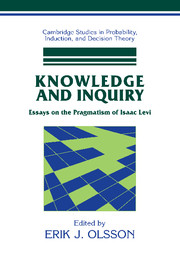Book contents
- Frontmatter
- Contents
- List of Contributors
- Preface
- Introduction: The Pragmatism of Isaac Levi
- 1 Isaac Levi and His Pragmatist Lineage
- 2 Is Pragmatist Truth Irrelevant to Inquiry?
- 3 The Knowledge Business
- 4 Infallibility and Incorrigibility
- 5 Why Inconsistency Is Not Hell: Making Room for Inconsistency in Science
- 6 Levi on Risk
- 7 Vexed Convexity
- 8 Levi's Chances
- 9 Isaac Levi's Potentially Surprising Epistemological Picture
- 10 Isaac Levi on Abduction
- 11 Potential Answers – To What Question?
- 12 Levi and the Lottery
- 13 The Value of Truth and the Value of Information: On Isaac Levi's Epistemology
- 14 Decision-Theoretic Contraction and Sequential Change
- 15 Deciding What You Know
- 16 Levi's Ideals
- 17 The Mind We do Not Change
- 18 Psychoanalysis as Technology
- 19 Levi on Money Pumps and Diachronic Dutch Books
- 20 Levi on the Reality of Dispositions
- 21 Replies
- Index
- References
10 - Isaac Levi on Abduction
Published online by Cambridge University Press: 05 March 2010
- Frontmatter
- Contents
- List of Contributors
- Preface
- Introduction: The Pragmatism of Isaac Levi
- 1 Isaac Levi and His Pragmatist Lineage
- 2 Is Pragmatist Truth Irrelevant to Inquiry?
- 3 The Knowledge Business
- 4 Infallibility and Incorrigibility
- 5 Why Inconsistency Is Not Hell: Making Room for Inconsistency in Science
- 6 Levi on Risk
- 7 Vexed Convexity
- 8 Levi's Chances
- 9 Isaac Levi's Potentially Surprising Epistemological Picture
- 10 Isaac Levi on Abduction
- 11 Potential Answers – To What Question?
- 12 Levi and the Lottery
- 13 The Value of Truth and the Value of Information: On Isaac Levi's Epistemology
- 14 Decision-Theoretic Contraction and Sequential Change
- 15 Deciding What You Know
- 16 Levi's Ideals
- 17 The Mind We do Not Change
- 18 Psychoanalysis as Technology
- 19 Levi on Money Pumps and Diachronic Dutch Books
- 20 Levi on the Reality of Dispositions
- 21 Replies
- Index
- References
Summary
Progress is impossible without change; and those who cannot change their minds cannot change anything.
George Bernard ShawThe purpose of this chapter is to survey Isaac Levi's conception of abduction and to contrast it with other work on abduction to be found in the literature. In particular, I concentrate on developments in abductive logics within the area of artificial intelligence where the main concern is to implement an abductive form of inference. I contrast the views to be found there with Levi's conception of abduction. In large part, I show that Levi's notion of abduction is quite distinct to what is found in the artificial intelligence literature.
Deduction, induction, and abduction have variously been viewed as essential elements in the stages of scientific inquiry. Isaac Levi's work has gone a long way toward clarifying these notions and identifying their roles in a reasoner's process of inquiry. In brief, abduction is used to identify potential answers to an inquiry; induction selects the most desirable of these given the reasoner's requirements; and deduction determines the consequences of this selection. I seek to examine abduction's role in further detail by looking at Levi's notion of this process and contrasting it against other views. While I have less to say about induction and deduction, I also touch on them as the three processes form a coherent whole in Levi's work.
I begin in the next section with a brief overview of Peirce's theory of abduction.
- Type
- Chapter
- Information
- Knowledge and InquiryEssays on the Pragmatism of Isaac Levi, pp. 143 - 156Publisher: Cambridge University PressPrint publication year: 2006

